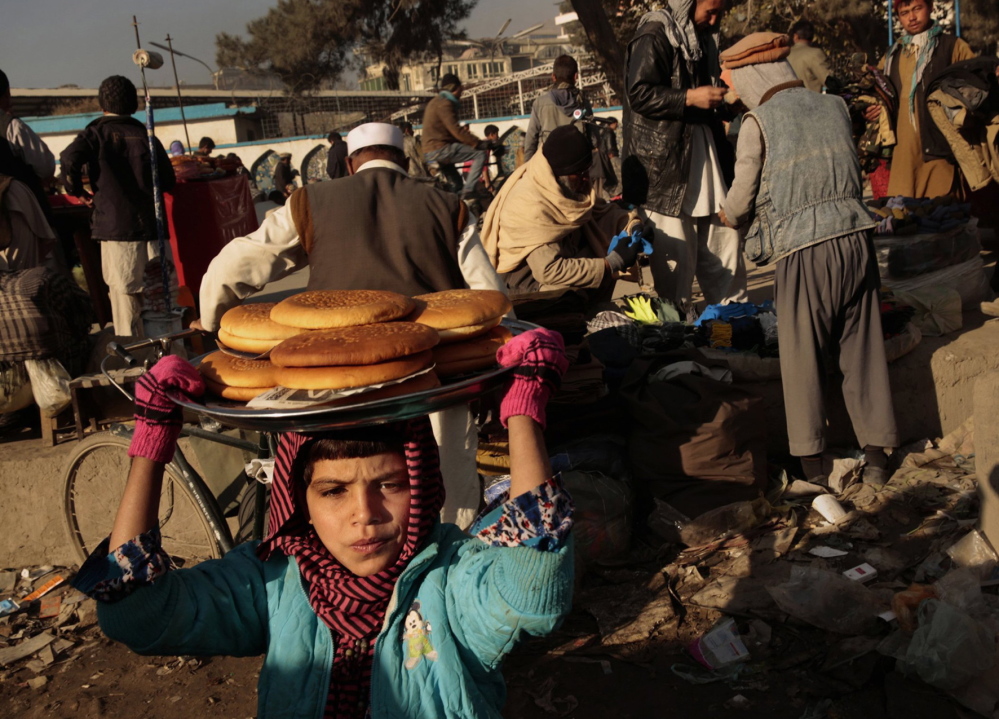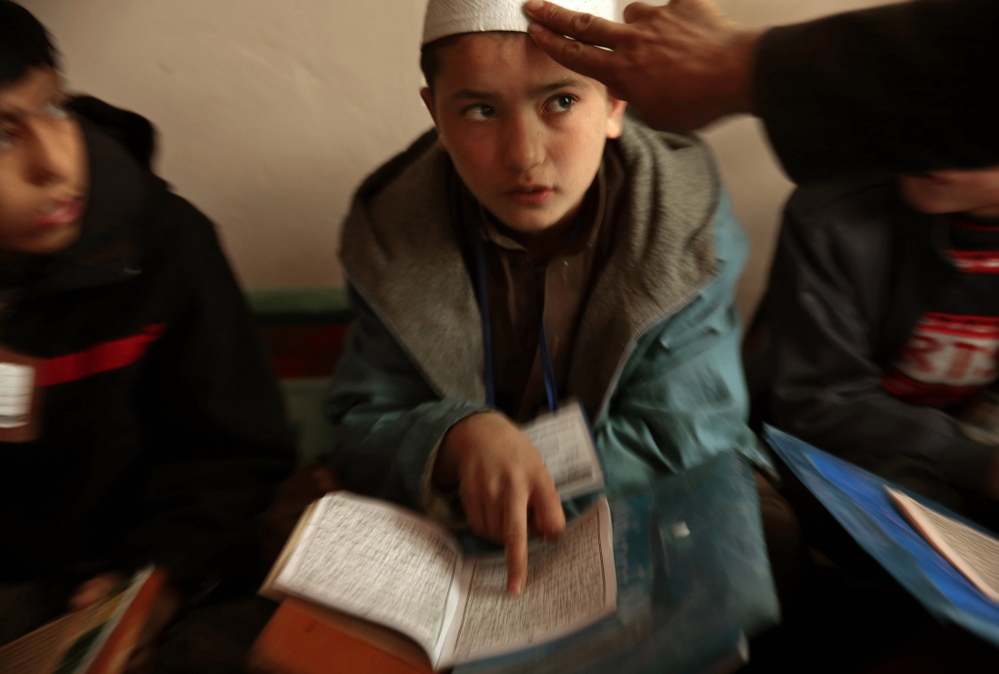KABUL, Afghanistan — Sami Rahimi sleeps fitfully on a bread rack above the cold concrete floor of a bakery. He rises at 5 a.m., sweeps up, washes in a pan of chilly water, then prays.
Before the sun has risen, Sami is pushing a dented wheelbarrow through the dim streets, at 13 still a tiny figure among the vegetable hawkers and butchers slicing bloody flanks of sheep from carcasses hung on hooks. He gathers water from a public well and takes it back to the bakery.
By 6 a.m., the gas-fired stone kiln is glowing a fiery red. Dough is flung against its curved walls to bake into the flat loaves known as khasa and the round loaves called kamachi. The sweet aroma of fresh bread wafts through the cramped storefront.
Sami sweeps a platform where hot flatbread is stacked for sale. He then sits cross-legged to begin the long hours of selling each loaf for 10 afghanis, about 20 cents, to customers who thrust worn bills through a window that he opens and closes with a long metal hook.
Working until dark six days a week, Sami earns about $80 a month, enough to support his entire family: disabled father, mother, three brothers and five sisters.
Sami has been at the bakery since he was 10, when he rode a bus here from the northern countryside to assist his uncle, Yar Mohammed, the bakery owner, who himself began at age 8.
“I’m happy I can support my family, but I would rather go to school and be an educated person,” Sami says. He shrugs as he flips over a steaming loaf with his hook, a weary gesture that makes him seem old and careworn. He is the only person in his family with a job.
The work bores him, and he stares out the smeared glass window daydreaming of a better future: graduating from a university and becoming a teacher or engineer, a learned man, not a barely literate little boy peddling bread.
CHILD LABOR is endemic in Afghanistan, despite vaguely written laws that prohibit children younger than 14 from working full time. The regulations, adopted in 2007 and last revised in 2012, allow those 14 and older to serve as apprentices and those 15 to 18 to perform “light work.” They prohibit children younger than 18 from work considered hazardous or dangerous to their health.
But the laws are widely ignored because of resistance from employers and from families who need the income, said Sami Hashemi, a child-protection specialist for UNICEF in Afghanistan.
Children as young as 6 work in brick making, carpet weaving, construction, mining and farming. Others resort to begging, collecting garbage or selling trinkets on the street.
Families scramble for any job to survive. “They must focus on today, not on a future for their children,” Hashemi said.
Aid groups that have poured billions of dollars into Afghanistan since 2001 are unsure how many children work. The best estimate is nearly 2 million between the ages of 6 and 17, or at least 25 percent of Afghan children, Hashemi said. The numbers are rising as growth in mining and construction, fueled by international assistance dollars, has lured more underage workers.
In a U.S. Labor Department report last year, the word “unavailable” is listed in a chart on the numbers of Afghan working children. The report describes sexual abuse of children who herd livestock. And it tells of children maimed or killed in construction jobs and forced to work in extreme cold or heat, carry heavy loads, smuggle narcotics or serve as soldiers.
“Research does not show any laws to prohibit child commercial sexual exploitation, pornography and use of children in illicit activities,” the report says. “There do not appear to be any mechanisms to reach children involved in the worst forms of child labor in the informal sector.”
Asked whether it was frustrating for a child-protection specialist to see youngsters performing punishing or dangerous jobs, Hashemi replied, “Any human being, when he sees kids with a right to education and recreation working under these conditions, will be frustrated.”
ON THE CHAOTIC streets of Kabul, skinny kids dart among the vehicles in traffic. They tap at windshields and beg for money. They pester drivers to buy chewing gum, candy, maps, matches, scarves, toilet paper. They collect trash to burn for fuel, or pick through garbage heaps for rotting fruit or half-eaten kebabs.
At the downtown taxi ranks, drivers pay small boys about 10 cents for each fare they enlist. They are a manic and aggressive lot, competing and cajoling and jabbering. Sometimes they half-drag, half-shove fares into taxis already jammed with men whose knees are folded to their chests. They are more gentle with the burqa-clad women, helping them into open taxi trunks.
Abdul Rafi’s voice emerges from his scrawny body as a croak. He’s only 9, but he has the coarse rasp of a lifelong smoker. He says he wore out his voice screaming at fares, an endeavor he began at age 6.
Abdul is the oldest of three brothers, and it has fallen to him to find work in this country whose traditions require that elder sons support their families. He is up every day at 5 a.m. for morning prayers. Then he hustles to the taxi rank amid a cacophony of donkey carts, creaky old Toyotas, Afghan military vehicles brimming with gunmen and black SUVs ferrying warlords. Most days, he barely earns $3.
“I would rather just go to school,” Abdul says. “But my family needs the money, and I’m the oldest.”
He wants to be a soldier one day – a literate soldier. He takes off four hours for class on school days, then hustles back to catch the late-afternoon rush hour.
He’s still shouting for fares at dusk, until the shrill call from the muezzin signals evening prayers, and Abdul is off, just another working stiff on his way home.
AT THE BAKERY, the kiln is still glowing at dusk, and Sami Rahimi is selling fresh naan for dinner. Some customers buy on credit. Sami cuts a notch into a long stick to track each purchase; at the end of the week, he counts the notches and collects payment.
Yar Mohammed, his face glistening with sweat, laughs. “We live in the 21st century, but we still count on sticks,” he says.
Mohammed says he too supported his entire family when he started working in a bakery at age 8. After 20 years, he opened his own place.
“Young boys have always worked in bakeries. That’s our tradition,” Mohammed says, shrugging, when asked about child labor laws. And Sami isn’t working against his will; the boy considers himself fortunate that his uncle hired him as a favor to his father.
Mohammed blames Western aid groups for not doing more to find alternatives for poor families and their children.
“Billions of dollars have come to Afghanistan,” he says. “Where did it go? Wasted. Stolen. The system is corrupt, and the Americans are part of it.”
Mohammed has promised Sami’s father that the boy will be educated. “I don’t want this boy to have my life – stuck inside this bakery,” he says.
Sami listens and nods. Every day, even when he’s dealing with customers, his mind is focused on the future.
“I think always about my lessons,” he says. “I think about my future, which is my education.”
Sami hasn’t been home in 45 days. He misses his family, he says, but the men in the bakery serve as his family for now.
Customers are thinning out, trudging home in the dark. Soon, Sami will hop down from his perch and help clean up the mess from the long day. By 10 p.m., he will curl up beneath a blanket on the rack and fall asleep beside the embers dying in the kiln.
Send questions/comments to the editors.




Success. Please wait for the page to reload. If the page does not reload within 5 seconds, please refresh the page.
Enter your email and password to access comments.
Hi, to comment on stories you must . This profile is in addition to your subscription and website login.
Already have a commenting profile? .
Invalid username/password.
Please check your email to confirm and complete your registration.
Only subscribers are eligible to post comments. Please subscribe or login first for digital access. Here’s why.
Use the form below to reset your password. When you've submitted your account email, we will send an email with a reset code.